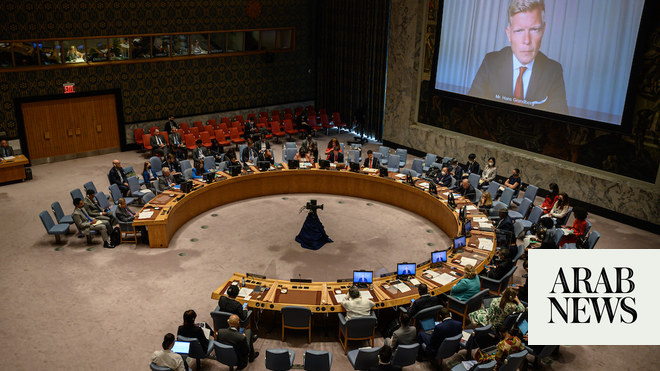
NEW YORK: UN Secretary-General Antonio Guterres has called on authorities in Beirut to respect the decision of the Special Tribunal for Lebanon, which on Thursday imposed life sentences on two members of Hezbollah for involvement in the 2005 bombing that claimed the life of former prime minister Rafik Hariri.
Hariri was killed on Feb. 14, 2005, by a suicide bomber who targeted his armored convoy on the Beirut waterfront. The blast killed 21 other people and injured 226.
The attack triggered nationwide protests that drove Syrian troops out of Lebanon after almost 30 years of military deployment in the country.
Salim Ayyash was convicted by the STL in 2020 and sentenced to life imprisonment for his part in the assassination, but the tribunal ruled that there was insufficient evidence to convict Habib Merhi and Hussein Oneissi. Prosecutors appealed against the acquittal and in March both men were found guilty.
All three men were tried, convicted and sentenced in their absence. They remain at large and are unlikely to serve any time in jail because Hassan Nasrallah, the leader of Iran-backed Hezbollah, does not recognize the authority of the court and refuses to hand them over.
Guterres said his thoughts “are with the victims of the Feb. 14 attack, and their families.” He also expressed his “deep appreciation for the dedication and hard work of the judges and staff involved in this case throughout the years.”
Noting “the independence and impartiality of the Special Tribunal for Lebanon,” he called on Lebanese authorities “to respect the decision of the Tribunal.”
Farhan Haq, a spokesperson for the UN in New York, told Arab News that the organization “welcomed the progress and the work being done by the Special Tribunal for Lebanon and we believe that this is a case where the people of Lebanon deserve justice.”
The STL was established at The Hague in the Netherlands in 2009 in line with a UN Security Council resolution. It eventually tried four suspects in absentia, one of whom, Assad Sabra, was acquitted.
Plagued by political issues in Lebanon, the court announced last year that it would have to close after dealing with outstanding appeals because it was running out of funding. This means the trial of Ayyash in a separate case involving three attacks on Lebanese politicians in 2004 and 2005 is unlikely to take place.












